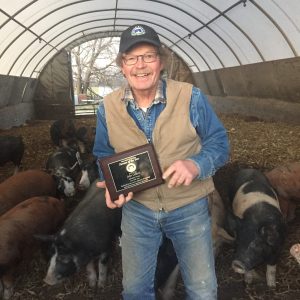Q&A With a Niman Ranch Farmer: John Gilbert
March 7, 2018 Family farmer John Gilbert started selling pigs to Niman Ranch 20 years ago when he and his wife were young parents to three small children. Their oldest son John joined the family farm and today the father-son duo are still raising hogs for Niman Ranch.
Family farmer John Gilbert started selling pigs to Niman Ranch 20 years ago when he and his wife were young parents to three small children. Their oldest son John joined the family farm and today the father-son duo are still raising hogs for Niman Ranch.
Q: What about farming keeps you on the land year after year?
A: Farming is a long-term endeavor. We’re carrying on traditions and creating opportunities for those who follow. We continue to solve challenges and make improvements to increase our productivity and generate economic activity that benefits our community.
Q: What does it mean to you to be a part of the Niman Ranch family?
A: There is no other opportunity to market something we raise to an organization that truly appreciates our efforts, and goes out of its way to ensure our welfare. Customers are really partners and generally take a real interest in us as individuals. It’s hard not to take extreme pride in Niman Ranch, knowing we’ve had a small part in its evolution.
Q: What are your family’s favorite farming activities?
A: We enjoy managing, grazing, and raising healthy, happy, productive animals and sharing our farm with visitors.
Q: What do you think is the most important reason to farm sustainably?
A: My role as a family farmer is primarily that of a caretaker. Benefiting from the use of our farms is reimbursement for our ensuring the resources will be available far into the future. Agriculture’s over-riding purpose is the survival of our species and our world. None of us know how long forever will be, but that’s how long our agricultural resources must last.
Q: What sustainable farming practices do you use on your farm?
A: Crop rotations are tailored to the landscape with upland areas rotated through small grains and hay, while lower, heavier areas are primarily in row crops. The most flood-prone and steepest areas are in improved pastures for rotational grazing by both cattle and sows. Areas prone to concentrated water flows are either terraced or in waterways. The south farm features more than two miles of permanently grassed headlands. The farm includes more than a mile of the Southfork, a tributary of the Iowa River. About 50 acres of the riparian area is in woodlands. The riparian zone also features a re-constructed shallow wetland and a prairie marsh remnant with many native plants and wildflowers.
Most row crops are raised without full-width tillage. Fertilizers are knifed into the zone where crops are planted, and nitrogen for corn is applied at planting and when the corn is about waist-high. Row crops are cultivated to assist with chemical weed control. All crops are traditionally bred and receive no glyphosate. Cover crops are being used on more row crop acres each year, primarily using seed raised on the farm. Manures are all spread as solids, principally to higher areas, or where stalks have been baled for bedding.
Q: How do you see your role as a Niman Ranch family farmer? How do you see your role in the community?
A: We’re dedicated to providing the best pigs we can. We hope to continue making improvements in the eating quality of the pork we provide. We’re committed to treating every animal in the best way possible and plan to continue increasing the number of animals we raise. We feel strongly the money received for our pigs helps us pay wages and other expenses which support the local community. We always try to use our operation as an example of what is possible by sharing lessons we’ve learned with others.
Q: Have you observed changes in the number, size, and type of farms that are found in your immediate locale? What is your attitude toward any trends you may have noticed?
A: We have not only lost family farmers, resulting in larger farms, but we’ve lost a sense of having neighbors. Institutions like local co-ops which once offered neighborhood cohesion are also gone or merged to the point they’re no longer anything more than another business.
Q: If you could broadcast a message about farming to people across the country, what would it be?
A: This country faces many problems: socially, economically, culturally and politically. Farmers are independent business people, the underpinning of local communities, the training ground for future generations with important life skills, and an enduring example of how everyday people come together to create a democratic government. Yet there have always been those who seek to exploit the farmer and his/her work for their benefit. Those who eat because of the efforts of farmers need to know they benefit most when the farmer gets a fair deal. That’s why rare opportunities like those offered by Niman Ranch are critically important – and about so much more than being the finest tasting meat in the world. We’re all in this together.
